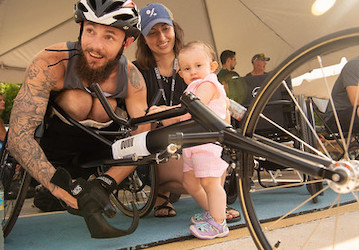Returning home after a deployment or training can be exciting but stressful. Still, coming home might present even greater challenges when a Service Member is injured. If you have kids, explaining an injury—either visible or invisible—to them can seem overwhelming, but you can cope by using a few basic communication strategies.
Injury affects military wellness and military families
Combat injuries can vary widely in terms of type and impact to the Service Member and their family. New technologies, medical advances, and different types of equipment have led to higher combat survival rates and made life with injury more common for many Service Members. Visible injuries (or those that primarily affect physical capacities) include musculoskeletal injuries, shrapnel injuries, damage to hearing or vision, or burns. Invisible injuries are those that might not be readily seen and primarily impact mental and emotional capacities or cause changes to behavior and one’s ability to build or maintain relationships. Examples might include traumatic brain injury, depression, post-traumatic stress, or even substance abuse disorders. The scope of one’s injuries aren’t only visible or only invisible: Many Service Members experience both—for example, someone who experienced an explosion might suffer from hearing loss as well as trauma from the event.
Whatever the case might be, injuries of all kinds impact the lives of injured Service Members and their families. Dealing with an injury can affect how members of your family relate to one another. It also might mean you and your family have to adjust your daily routines or schedules, and the direction of parents’ attention and support gets shifted around too. The way a family adapts and how everyone’s life is affected also changes over time as recovery or adjustment occur.
Whether adjustment means full recovery or that you and your family have come to understand the impact of injury or disability on how you operate as a unit, you’ll get there.
When your family receives news of an injury, there’s a period of initial shock. Your partner and children might feel confusion or anxiety, and it can feel chaotic. It’s normal for your partner, spouse, or co-parent to react strongly when hearing the news about your injury, and their fear and concern can sometimes spill over onto children. It can be a tough time for everyone, and kids might show their emotions through changes in their behavior. For example, younger kids might act out or have outbursts. Or they might become more inward and withdrawn. Older children might try to take on more household duties and unconsciously try to fill in for the injured parent, which can be a lot of stress for someone who is still growing. As a family, some or all of you might need to relocate for treatment or live apart due to rehabilitation, all of which can be difficult for children to understand or process.
While the initial period of finding out about an injury can be hard, over time you’ll get to a place of adjustment. Whether it means full recovery or that you and your family have come to understand the impact of injury or disability on how you operate as a unit, you’ll get there. On the way, you might also experience feelings of grief or loss, and that’s normal too. It’s important to remember that recovery and adjustment aren’t a linear process, and there will likely be setbacks while healing. The key is to communicate appropriately and keep your children in the loop.
 7 strategies for optimized military families Read More
7 strategies for optimized military families Read More
Supporting kids affected by a parent’s military injury
It’s normal to worry about your children’s reaction to physical or mental injuries. If possible, talk with them about their other parent’s injuries before your family reunites and throughout the recovery process. Children, family dynamics, and injuries are all unique. Keep some of these support strategies in mind:
- Use age-appropriate words to describe the other parent’s injury. For example, what you say to your six-year-old is different than what you discuss with your sixteen-year-old. Consider using dolls, videos, and books to help explain the injury and what it might mean for your kids. Also, take the time to help your kids develop an injury story—a few-age appropriate sentences they can easily tell others when sharing what happened to their parent. Coach them on how to respond to questions too.
- Talk about what happened and what to expect. Be honest when explaining the injury, how it occurred, and any expectations about recovery. Not knowing what’s going on might cause kids to imagine scary, wrong, or bad things. Let them know there might be ups and downs through the recovery process. Also, discuss the mental and emotional changes they might not be able to see right away.
- Consider what your kids should see and what they should avoid. Brainstorm with your partner or with a professional (healthcare provider, social worker, or counselor) on what types of medical information or activities your children should avoid and what are OK. For example, can they handle visiting a hospital setting? Or will it be too scary or make them anxious? Consider alternatives like waiting until their parent is in a rehab facility or sticking to video calls in the meantime.
- Discuss practical changes. As you get through the initial shock of the injury and once you start to understand the nature of the injury as adults, be sure you take time to talk with your kids about what it means to them. For example, a parent with an arm injury or amputation might not be able to play with them in the same way. Or, if a parent has a TBI, kids might need to know to keep the volume on the TV low to address sensory sensitivities. Talk about the changes and how each family member might be affected.
- Be the model. Everyone responds differently to difficult news. Don’t force things. Be patient with your kids and yourself too. Support your children however they respond. And encourage them to share their feelings and ask questions. Children take cues from their parents. If you cope well with your Service Member’s treatment, your kids are more likely to as well. Focus on building your own skills and managing your emotions so you can model those habits for your kids.
- Encourage expression. Children don’t always have the words or communication skills to effectively talk about their feelings, so give them tools to help them express anger, sadness, frustration, and other feelings. Talk about ways they can cope with their emotions when they feel overwhelmed too. As a parent, keep an eye on changes in behavior that might indicate your child is struggling. Seek professional help if you’re concerned about how your child is adjusting.
Remember: There’s no perfect explanation for how to support your kids and family through an injury. What’s most important? Talk, listen, and avoid judging their responses.
